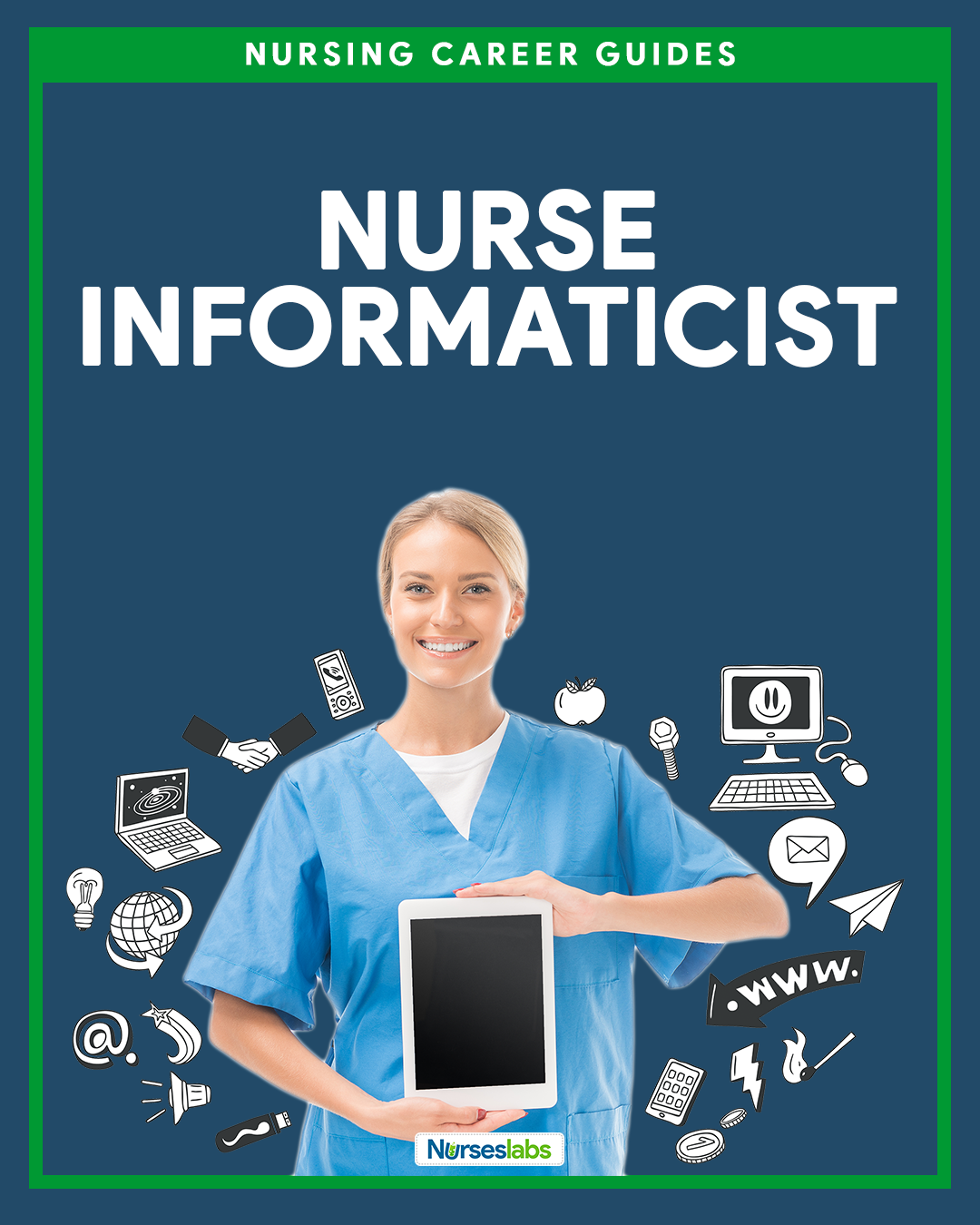Attracted to a career in nursing informatics and believe you have the skills, interests, and abilities? Are you comfortable with computers and technology? Are you an electronic health record (EHR) superuser – the first nurse on the floor who “gets” changes and ends up teaching the others? Do you often have ideas about how hardware and software could be developed to make it easier for nurses to use or to improve patient care?
If this is you, a career in nursing informatics might be your niche! Taking the plunge could be a step in the right direction for growing your career. Nursing informatics is a nursing specialty that not only pays well but has varied opportunities and for which there is a growing demand in the face of rapidly evolving technology.
Nursing informatics is a challenging and exciting specialty combining your love of and experience in nursing with your aptitude for technology. IT applications in health care settings are growing by the day, and so is the demand for nurses to work in this field. In a recent survey, the Healthcare Information and Management Systems Society (HIMSS) found that 95% of the respondents “view health IT as a strategically critical tool to help healthcare organizations be successful.”
What is Nursing Informatics?
There are few areas today where nurses do not use some form of technology in caring for their patients – think diagnostic equipment, monitors, patient records, and medication orders. Technology has contributed to providing valuable information in real-time, improved patient records, and a reduction in errors. Because nurses are the primary users of the technology that contribute to clinical processes, nursing workflow, and patient care, a nursing perspective is essential in designing and implementing the information systems in health care.
Nursing informatics is the intersection between nursing care, technology, health information systems, and the data used in health care settings. The nurse informaticist is a qualified nurse, with nursing experience – which gives her the background of the procedures, processes, and challenges of everyday nursing and patient care – together with advanced knowledge of technology and information systems. Nurse informaticists work in many different settings and under various titles including nursing informatics clinician, clinical informatics coordinator and IT clinical nurse.
The difference between nursing informatics and health informatics is that the former focuses on patient care whereas health informatics deals with administrative issues in the health care setting such as data security and issues around legal compliance.
Although you may not have heard of it before the specialty of Nurse Informaticist was recognized by the American Nurses Association as early as 1992, which was also the year in which certification was introduced. This organization published the first Scope and Standards of Nursing Informatics Practice in 1994, and the fourth, updated version appeared in 2015. The first graduate program in nursing informatics in the US was established at the University of Maryland in 1988 and soon followed by the University of Utah.
Informatics nurses established an organization called CARING in 1982 to provide a forum to advance automated information systems in health care. The American Nursing Informatics Association (ANIA) was formed in 1992 to provide resources, education, and networking for nurses working in informatics. These two organizations merged in 2010 as ANIA-CARING but in 2012 the name American Nursing Informatics Association with the tagline “where caring and technology meet” was adopted – maintaining the history of both organizations. Today the ANIA has a membership of around 3,200, including nurses as well as other professionals interested in nursing informatics.
What are the Responsibilities and Duties of a Nurse Informaticist?
The daily activities of nurse informaticists differ depending on the setting in which they are employed. All, however, have some role in connecting nursing and patient care with those responsible for supplying and developing technological applications based on their job description. This could include the selection of hardware and software, making sure that the nurses on the floor know how to use the systems, and also providing ongoing support. The nurse informaticist is also involved in problem-solving and developing new and more efficient systems – all with the aim of improving the quality of patient care.
The nurse informaticist acts as a go-between in identifying, developing and introducing informatics tools and processes that support the nursing process within a particular health care setting. “I act as a liaison between the technical and clinical communities. When a client wants a specific functionality or workflow, I can take it and go to the application builders and speak their language to explain what the clinical folks are looking for. If technical people have issues, I can go back to the clinical folks and try to find the resolution that will technically work,” explained Gina Wade.
The liaison role is ongoing and applies whether a new system is introduced or systems are adapted and improved. The nurse informaticist often identifies the need for the latter through her observations and interactions within the health care setting as well as analysis of the data provided by the electronic information systems. The data can, for example, show up trends and frequently occurring errors.
Thus research and development is another critical function of nurse informaticists – identifying where IT can contribute even further to better patient care and improved outcomes. They could, for example, identify common factors in patients who are later readmitted. “We’ll take those variables and identify how and wherein the system we should alert a nurse that this is a possible red flag and give her the elements of a plan to decrease the risk for a readmit,” Wade clarified. In another example, new software is being developed where patient acuity, established from nursing documentation, could determine the staffing needs of each unit on a specific day.
Most nurse informaticists are also involved in teaching nurses and other personnel on how to use specific information systems and providing ongoing support – answering their questions and solving problems that arise. To a large extent, the acceptance and integration of the technology into the daily workflow depends on them, so the ability to communicate well and manage change is essential.
Informatics nurses also have to work closely with management concerning informatics policy development and implementation, as well as ensuring that regulatory, patient safety and confidentiality, and quality improvement requirements are met.
Where do Nurse Informaticists Work?
Most nurse informaticists are employed at hospitals, although the number employed in other health care facilities, such as clinics, is increasing. Some highly qualified nurse informaticists advance to leadership positions such as serving as the clinical IT leader in large hospital groups under the title of Chief Nursing Informatics Officer.
Other informatics nurses work in higher paying jobs at IT consulting firms or for vendors who supply services to the health care industry. These nurses are often offered jobs after having been identified in a health care setting by the company concerned.
Increasingly, leading nurse informaticists are also working for policy and standards organizations. An example is Judy Murphy who was appointed as Deputy National Coordinator for Programs & Policy at the Office of the National Coordinator for Health IT at Health and Human Services in Washington, DC.
What are the qualifications of a nurse informaticist?
Besides an excellent clinical nursing background, one quality which you need to work in this field is a strong technological aptitude – although not necessarily technical expertise, which is usually acquired on the job. Other essential qualities are problem-solving and analytical thinking abilities, a questioning mind, excellent communication skills, as well as being able to organize and manage.
Nursing informatics is one nursing specialty where you do not have to hold a formal qualification to be able to work in the field – many nurse informaticists started their careers after being asked to join clinical informatics teams at their workplace. Obtaining a formal qualification is however a good idea if you want to advance your career. About 57% of nurse informaticists hold at least a master’s degree.
The ANA distinguishes between an informatics nurse specialist, who is a registered nurse with a formal graduate qualification in informatics or a related field, and an informatics nurse, who has experience in informatics but without graduate education in the subject. Both can, however, apply for formal certification.
Nurses who want to study to get into nursing informatics, or advance their careers, have a choice of bachelor’s, masters and doctoral degrees. If you didn’t qualify with a degree in nursing, you could consider a bachelor’s degree in healthcare administration or informatics. If you hold a bachelor’s degree in nursing, you can enroll for a Master’s or even a Doctoral degree in nursing informatics. You can also obtain these qualifications through part-time online study.
As with all nursing specialties, board certification provides recognition of your skills and may be required by some employers. Certification for nursing informatics is provided by the American Nurses Credentialing Centre (ANCC) and is also open to international applicants. To apply, you need a bachelor’s degree, two years of experience as a registered nurse and proof of continuing education in informatics and some practice experience in nursing informatics. You could also apply for certification by the as either an associate or professional in healthcare information and management systems.
What is the Salary Range for Nurse Informaticists?
Specific data on the salaries of nurse informaticists is not available, but according to a 2018 survey by the HIMSS, the average salary of digital health professionals involved in direct management, development or support of IT is $109,610 per year.
Consider also that nursing roles in all healthcare settings are continually expanding and that the job of software developer made the first place in this year’s “Best 100 jobs in America.”
What are the Pros and Cons of Nursing Informatics?
The only drawback reported by nurses in this field is that they are no longer involved in direct patient care – missing the interaction with patients and fearing that they would lose their clinical skills and judgment. Some select to work weekends or other shifts on a part-time basis but this can be very demanding. “I have developed other ways to stay connected with the clinical environment. I maintain that staying connected to clinical practice is extremely important for the healthcare informatics professional,” explained informatics nurse Mark Sugrue.
Another challenge in this area of work is adjusting from being a direct caregiver to stepping back and becoming an observer. Overall, however, there is a good balance between working on your own and working and communicating within the health care setting.
Younger nurses often do well in this field because they grew up with and have a passion for technology. Nurses in the area warn that this is not a job for those who go there believing it will be less stressful than working on the floor. “What I found is that the people who have tried to do that […] they often hate every moment of it. It’s some pretty intense work. I probably did some of my most robust critical thinking in informatics,” said Brittney Wilson, who also wrote The Nerdy Nurse’s Guide to Technology.
As a nurse informaticist, you can make a real contribution to helping nurses with their daily work and improving the quality of patient care. There is an opportunity for critical thinking and creativity which is very fulfilling. Jobs in IT also often provide an opportunity to work from home although, especially in the case of health IT, you will probably need to acquire a high level of skill and experience before making this transition.
With the rapidly expanding use of technology in health care, the demand for skilled nurse informaticists is already exceeding supply and is destined to grow. A HIMSS survey found that 79% of healthcare employers planned to employ more IT staff in the future.
Nursing Informatics Organizations
Helpful nursing organizations you must know if you want to become a nurse informaticist:
- The American Nursing Informatics Association (ANIA). An organization for both nurses and allied personnel committed to nursing informatics. The organization aims to advance the field through education, research, and practice. ANIA has branches, holds regular conferences, and publishes the quarterly Journal of Informatics Nursing.
- The Alliance for Nursing Informatics (ANI). This is a collaboration of organizations, bringing together various groups that function in nursing informatics. They provide a unified voice to advance nursing informatics in improving the delivery of patient care.
- American Nurses Credentialing Centre (ANCC). Functioning under the ANA, the ANCC offers board certification in Nursing Informatics at a basic level of knowledge and skill.
- Healthcare Information and Management Systems Society (HIMSS). The HIMSS is a global organization focused on “better health through information and technology.” It provides a variety of professional development resources for persons working in this area. Many nurse informaticists are members of this organization through which they can also obtain certification in healthcare information and management systems.





Hi I’m from the Philippines and I want to take up Nurse Informatic MD. Is there any international school online that caters Philippines? Or Local accredited school for this matter?